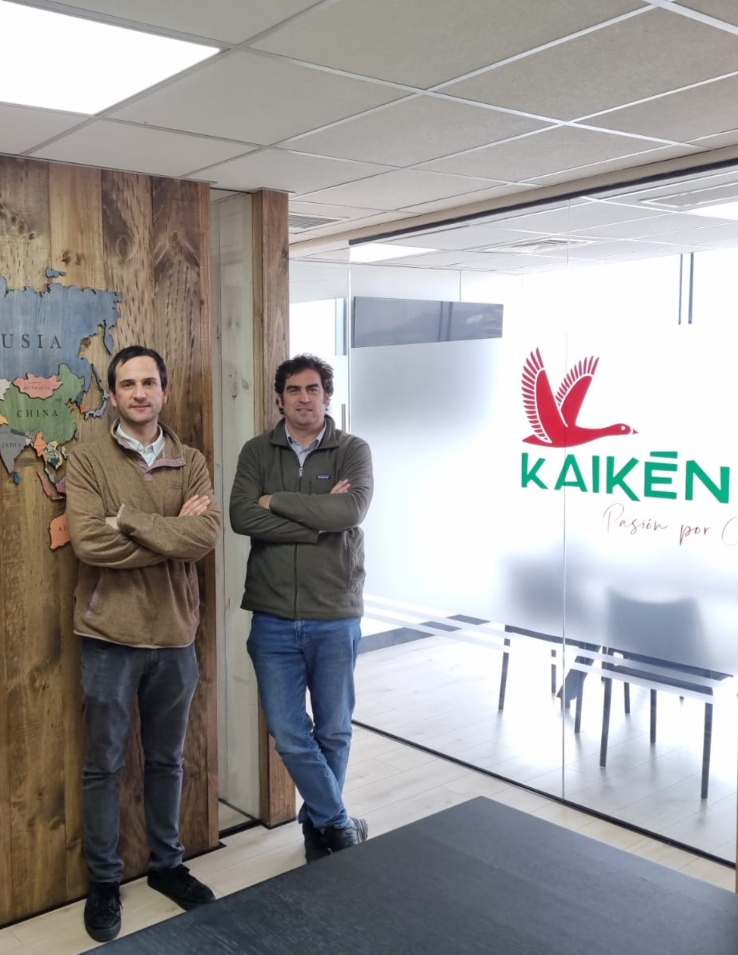Andrés Santa Cruz, founder and managing director of Kaikén, and Juan Coloma, commercial director of the firm since 2023, agree that the Chilean fruit industry faces the challenge of increasing the added value in its exports to the Asian giant.
“Despite the potential for our prunes, we lack a deep knowledge of the Chinese market; we need to know the final consumer, and even the final industrial buyer, because it is still a market that has a lot of intermediaries. So we need to know how the different types of products we make would work in that market and see how we can get closer to them,” they say.
Another issue is the language. “We have clients in China that we reach directly and they don’t speak English. The truth is that we have to use translators. So, there is also a cultural issue that is making these intermediaries really necessary,” adds Andrés Santa Cruz.
Despite the above, China has been very strong, taking over by far the first place as an importer of Chilean prunes. Until June of this year, exports to that country had grown by 70% compared to the same period of the previous year. Given the above, there is little volume available and better prices in recent months. “We have to see this China factor, how it will continue for other seasons,” they point out.
The challenge for Kaiken and for the Chilean industry in general – along with what was pointed out at the beginning – lies in how to capitalize on this sustained growth in Asia, particularly in China and India, while continuing to innovate in products and services. The trade agreement with India, although still in its early stages, presents a significant opportunity to increase the presence of Chilean prunes in the world’s largest market, although this will be a long-term process that will require continued investment in marketing and market development, says Juan Coloma.
In the first half of 2024, ProChile, thanks to a competitive fund, and in conjunction with Chileprunes, has begun the execution of projects to promote prunes in India. It began by promoting the product on Indian social networks, a task carried out in conjunction with the local agency SS Associates, and the focus of the messages had to do with the multiple nutritional and health benefits that prunes provide. In addition to the above, work has been done with important Indian influencers who are experts in nutrition, doctors and chefs and promotional activities have been developed at the points of purchase (POP or Point Of Purchase) and at the point of sale (POS or Point Of Sale), with graphic support and tastings.
Kaiken, quadrupling results
Kaiken has had remarkable growth from 2019 to date: it has managed to increase its export volume by over 400% (4.2 times) considering its entire range of products and where the star product (more than 50% of its business) is prunes, but it also includes fresh plums, cherries and nuts.
Indeed, one of the key factors in this growth has been the diversification of its products and services, adapting to the demands of the international market. This diversification not only allows them to offer more options to their customers, but also gives them the flexibility necessary to face market challenges.
The Kaiken team has grown in parallel with the company’s expansion. This growth has led to the opening of new offices in Santiago, a milestone for the company.
Kaikén is a company created by Andrés Santa Cruz, with more than a decade of existence, which in 2021 renewed its image due to a change in the business vision that aims to strengthen itself in the field of fresh and dried fruit (previously it was called Surnat, a name that was closely related conceptually to dried fruits).
The company does not have plantations – that is, it does not have its own fields – but it does work with related fields located in Buin and the south of Chile and with a network of associated producers mainly in the VI and VII regions.
This year they will export close to 2 thousand tons, a significant change compared to the 1.5 thousand tons of last year, ranking among the top 15 companies in the area.
For the 2025 season, Kaikén hopes to continue growing hand in hand with a better harvest in quantity and quality. The 2024 season was very special, with a very hot summer without major thermal variations, which caused the plums to have a lower sugar content. This affected the drying yields, which were much lower than normal (they went from an average of 3.2 fresh kilos to 4 fresh kilos to obtain a dry kilo).
“We had a plum that instead of having 22 or 23 degrees Brix, at the time of starting the harvest and ending with 25 to 28, we started the harvest with 17 and ended with 21. And therefore, by having less sugar, there is less yield in drying,” they point out.
Despite the poor drying yields, Chile managed to have a good harvest this 2024, concludes Santa Cruz.



